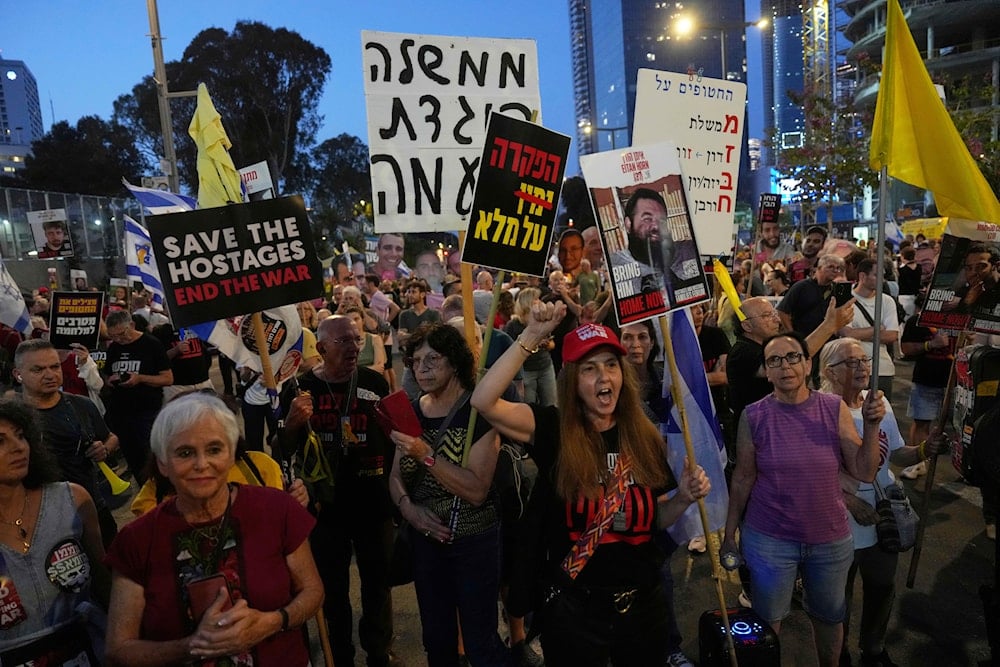Israeli families fear partial Gaza deal will leave captives behind
Families of Israeli captives in Gaza warn that a partial deal, reportedly backed by Netanyahu and US envoy Steve Witkoff, could leave captives behind.
-

People take part in a protest demanding the end of the war and the immediate release of captives held by Hamas in the Gaza Strip, and against Prime Minister Benjamin Netanyahu's government, in Tel Aviv, on May 31, 2025. (AP)
Families of Israeli captives held in Gaza voiced alarm during a weekly press conference over ongoing negotiations that could result in a partial captive release, warning that such a deal could endanger those not included.
Einav Zangauker, whose son Matan is among those being held, revealed that she recently learned he had narrowly survived multiple airstrikes by the Israeli army. In one instance, she said, he nearly suffocated from toxic gases in a collapsed tunnel.
"Matan miraculously escaped bombings several times," she said, adding, "In one case, he almost suffocated to death from toxic gases in a tunnel that was bombed and collapsed."
Zangauker criticized Israeli Prime Minister Benjamin Netanyahu for pursuing what she described as a partial deal, warning it would amount to a "death sentence for hostages that remain behind."
Read next: 'Israel' killed tens of its own captives in war on Gaza: NYT
Netanyahu 'shattering Israeli ethos for political reasons'
Yehuda Cohen, the father of captive Nimrod Cohen, also expressed fear that his son would be excluded under the current proposal being negotiated by US special envoy Steve Witkoff, adding that "he is likely to pay the price of Prime Minister Netanyahu’s insistence not to end the war" and that "Netanyahu is abandoning my son and is shattering the Israeli ethos for political reasons."
Families demanded a comprehensive deal that would secure the release of all captives, criticizing what they described as political calculations taking precedence over human lives. The concerns come as Washington’s special envoy, Steve Witkoff, continues to mediate a ceasefire and prisoner exchange deal between "Israel" and the Palestinian Resistance in Gaza.
While some officials are reportedly backing a phased release, captive families fear that such an approach could prolong the suffering of those still in captivity and reduce international pressure for a full agreement.
This is not the first time captive families have accused Netanyahu of choosing political agendas over the captives' lives.
Netanyahu refuses to budge, captive talks stall: Israeli officials
On a related note, earlier this week, Israeli captive Nimrod Cohen's brother accused Netanyahu of using "psychological terrorism" against the families of captives by hinting at a potential deal for their release, only to renege on his statements.
"It is psychological terrorism in every sense of the word for a prime minister to make a passing comment about my brother’s life," Cohen stated, as cited by Yedioth Ahronoth, adding that "it’s despicable and was done in an extremely crude and disgusting manner."
The captives' families expressed that they feel manipulated by Netanyahu, who appeared to mock or undermine the possibility of a serious deal to release their relatives, who remain in Gaza.
Hirut Namrodi, mother of captive Tamer Namrodi, told the Israeli Army Radio, "When the prime minister speaks on the matter, we believe something real may be happening. It has stirred frustration among all families."
Similarly, Eli Elbagh, father of former captive Liri Elbagh, spoke to Channel 12, relaying, "Families began to feel happy, truly happy, but soon realized it was meaningless chatter," noting that the remarks pushed families into a psychologically vulnerable state.
Accusing Netanyahu of irresponsibility, Elbagh said, "He is not just a tweeter. His words carry weight. Every word kills. Families no longer have the strength, 600 days is too long."

 4 Min Read
4 Min Read








